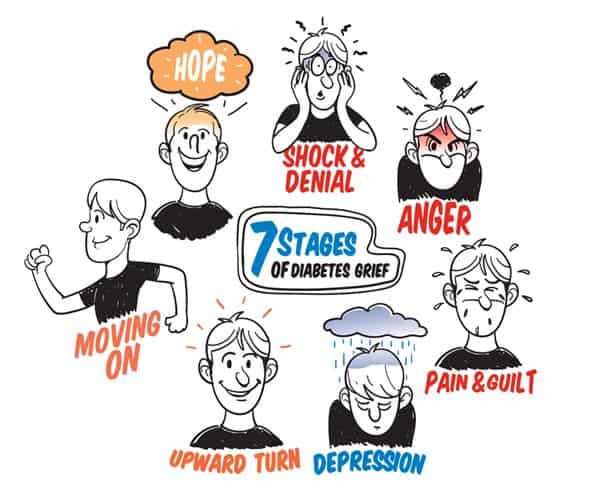When you are faced with the news that you or your child has diabetes there is really a wave of emotions you go through.
Personally for me at first it seemed like it was no big deal, “Diabetes” okay we can handle this, limit this and that and ta da! It wasn’t until I was face to face with the doctor’s at children’s hospital watching my son lie in the bed unconscious due to DKA, that this wasn’t the “Diabetes” I had pictured. This in fact was something much more serious.
I am a believer that with a life changing event such as a diabetes diagnosis that you follow through the stages of grief as you would when you lose someone you love. Think of diabetes this way.
The day you or your loved one is diagnosed you are losing something very precious and important to you, the carefree life from before. You may think you have big problems now, and nothing could be worse than these “problems” but then WHAM! Your smacked in the face hard with a diabetes dx. How do those “problems” look now? We lost the carefree, worry-free, childhood of our oldest child. That my friends are something to grieve about. I didn’t know it then but I really did go through the various stages of grief, and I still revisit a few of them from time to time.
For more informative articles read the following:
Here is what I refer to as the seven stages of Diabetes Grief:
1. Shock & Denial
Diagnosis day is when the shock and denial set in. You are shocked this happened to you or your child, seriously you’ve done everything you could to protect yourself and them so why you, why your child? The denial is a difficult part of the first stage because with a diabetes diagnosis there is no room for denial. You cannot think in the back of your brain that you don’t have it or your child doesn’t have it, because there is no ROOM for error or denial when it comes to diabetes. However, we all go through this step, some of us tend to linger in it a lot longer, it only becomes a problem when you are in denial so bad that you refuse to follow the treatment method laid out by your doctor.
My personal experience with this stage happened right around diagnosis, I didn’t want to believe this was happening, I cried more tears than I thought I possibly had. I was in denial, I didn’t want to accept that this was going to be the new “normal”, I felt like “Okay well we do this for a little while and everything will be back to how it used to be right?”. NOPE (wake up call, you’re not going back).
2. Pain & Guilt
The pain I’d love to say goes away, but it never does. The pain in your heart when you hear your child complaining about having diabetes or they had enough of the poking and injections, and site changes, that pain is still all fresh. It’s always there lingering underneath the surface. The guilt, well that goes away if you let it. I personally felt responsible in the beginning, kept blaming myself for not getting him to the doctor’s a lot sooner than we did, however the monster of diabetes had already started to take control of his body, long before any symptoms appeared. SO that guilt, I’ve shaken it and no longer feel as if it is my fault.
3. Anger & Bargaining
The anger, well that’s a tricky one. It can go away if you let it, but it always likes to rear its ugly face from time to time and will sneak back in if you keep the doors open. I’ve bargained, I’ve tried to tell the doctor’s to just take my pancreas and give it to Clifford. I’ve begged, pleaded, and prayed to God more times than I can count just to cure, and make my son one of the “miracles”. If you’ve ever uttered the words “WHY ME, or WHY THEM”, that’s the anger creeping back in.
4. Depression, Loneliness, and Reflection
With diabetes comes depression, for yourself if you are the PWD, or even if your child is the PWD. It’s just part of the life with diabetes. It doesn’t always have to be, and I’d love to say the depression goes away but from time to time like the anger if you keep the doors open, and you are feeling particularly helpless in the D department it will sneak back in.
Loneliness comes along with depression, it’s important in dealing with this disease that you surround yourself with others that know exactly what you are going through. Because only then do you not feel so “lonely”. If you are the main caregiver to your child, try to toss the stick in the other parent’s direction from time to time, don’t wear yourself too thin, or the loneliness and depression will sneak back in.
As D parents we revisit this stage often, more times than we’d like to admit. We have reflections about our life before all the worry. We get depressed knowing that we can never put our child to sleep again without worrying if they will wake up in the morning. If your child falls asleep earlier than bedtime, you freak out, no other word for it. You hold it together on the outside but on the inside you are freaking until a normal ‘in range’ number comes up on that meter. Yeah this stage is revisited way too often.
5. The Upward Turn
This is the stage when you are starting to get used to your new normal life. You know what needs done, and how to do it and you get into a new routine. Life doesn’t seem all that bad anymore, it’s part of your new normal, your new family life. This stage is a nice one. It’s nice when you don’t feel as overwhelmed as you did in the beginning.
6. Reconstruction and Moving On
This period takes some time to get to. This is the time when you start to reconstruct your new life, and lay the pieces of a new foundation in place. If your child is diagnosed this is the period in which you are teaching other family members about what is going on, what needs done, what to look out for, etc., etc. Because life goes on, it’s just life goes on with Diabetes in tow now.
7. Acceptance & Hope
This is one of the hardest stages to reach, and when you finally do reach it you may not stay there to visit for very long. You have finally accepted that in fact diabetes is an everyday part of your life, and your job now is to protect your child, yourself from this beast, and fight. Fight back, stay healthy, keep them safe, fight back with all you can, and hope for a better future, a future without diabetes.
TheDiabetesCouncil Article | Reviewed by Dr. Christine Traxler MD on June 03, 2020





